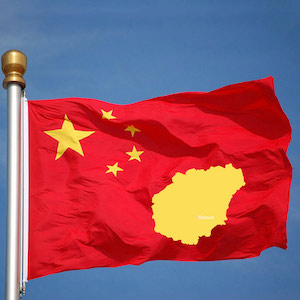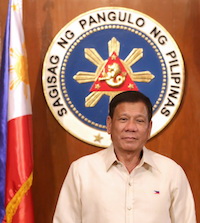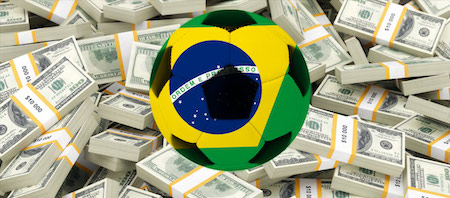China again made it way into the top global gambling stories of 2108, and UK fixed odds betting terminals and gambling advertising dominated the news. But the advent of sports gambling in Brazil easily became the top global gaming story of the year. 5. China’s possible introduction of tax-free gambling in Hainan Island
5. China’s possible introduction of tax-free gambling in Hainan Island
Gambling is not permitted in China proper, but is permitted in the Administrative Regions of Macau, which belonged to Portugal until 1999 and in Hong Kong which came under the UK until 1997. Bloomberg reported in April of 2018 that was set to change as China was going to announce plans to build up the province of Hainan on the South China Sea, which is a popular tourist destination for wealthy Chinese residents and vacationers. According to the Bloomberg report the province urged the Chinese government to attract more foreign investment to Hainan. So, in April of this year, Xi Jinping, the Communist Party president, who was recently appointed as leader for life after term limits were listed, announced a plan to gradually make the island a pilot free trade zone by 2020 and a full free trade port by 2025. The report indicated that it would encourage foreign investment in various areas including agriculture, entertainment, sports, betting, online gambling and lotteries with a possible expansion to land-based casinos in the future.
Not surprisingly, the news had many casino operators around the world salivating at the opportunity of operating in China proper and in Hainan’s tropical climate and more importantly away from the overcrowded and corruption filled streets of Macau. The government in Macau, on the other hand, was said to be furious about the report and indicated that they believed such a move would be a major mistake and would cannibalize revenues in that region and devastate its economy. Nevertheless, industry analysts were sure that land-based casino operators in Macau had nothing to worry about and one said the following to a South China Morning Post reporter in May:
"It's almost impossible for Beijing to allow the building of physical casinos... Casinos (are) against the overall ideology and the rules and laws of China."
The analyst proved to be right as the plan for physical casinos was more or less put to rest when Hainan Communist Party chief Liu Cigui stated in October that the reports in Bloomberg were not accurate:
"Some online comments about opening casinos, allowing gambling and horse racing, or copy from capitalism and adopt overall private ownership, are divorced from China's reality and (they are) resolutely not allowed."
Analysts, however, have reiterated that while physical casinos are off the table in Hainan the same is not true for tax free online gambling targeting non-Chinese residents. In fact, there are numerous reports that the province has talked to online companies about using the area to offer casinos, lotteries and sports betting in the future and targeting citizens in places like Malaysia, Singapore and the Philippines, who ironically have their own trade free zone that targets Chinese customers but disallows those companies to offer their products to local people. Consequently, if that goes through it would be a bit of tit for tat. 4. The end of Schleswig-Holstein independent casino and poker licenses in Germany
4. The end of Schleswig-Holstein independent casino and poker licenses in Germany
One of the more intriguing stories of the last few years was the brazen attempt by a state in Germany to gain some revenue and independence by attracting offshore gambling companies to run casino and poker games from their location. In 2010, the German federal government announced plans to open online sports betting to local and foreign gambling companies, but would not allow any casino or poker betting. They also announced a 5% tax on every bet. Upon hearing that, the state of Schleswig-Holstein passed its own law in 2012, which allowed any gambling operator, including poker and casino companies, to operate a website in the state of Schleswig-Holstein and there were no limitations to the number of licenses that could be handed out. Instead of a 5% tax on each bet, the state levied a 20% tax on gross profit which operators deemed more palatable. This decision caused a big fight between the state and the federal government over whether gambling was a national issue or a state issue and Schleswig-Holstein believed that the German constitution permits states to issue their own gambling licenses. Schleswig-Holstein issued 12 licenses in 2012, but in that year there was an election and the new state government agreed to adhere to the German federal law that allowed for sports betting, but not casinos or poker. The licenses that were issued could not legally be revoked, however, so Schleswig-Holstein and the federal government agreed to allow the licenses to operate for 6 years at which time they would be null and void and not renewed.
Online gambling companies that had licenses appealed, as did the EU, and the courts seemed to be wavering between support for the online gambling companies and for the German government. The decision finally seemed to be settled in 2017 when a court of appeals ruled that international operators were banned from offering non-sporting bets to German customers. That ruling, however, was confused again when Schleswig-Holstein elected a new government in 2017 which said they would not agree to the court’s ruling and said that they would continue honoring offshore licenses moving forward. The last license expired on December 21, 2018 but to date none of the companies, including the likes of Bet365 and PokerStars, have stopped operating in Schleswig-Holstein although they have scaled back operations targeting German customers. And GVC holdings cancelled the option of PayPal as a payment option for reasons unknown. In the meantime, the fight will continue, and one shouldn’t be surprised to see a situation in Germany like the U.S., where its highest court is forced to step in and decide once and for all if state right supersede federal rights on gambling issues.  3. The ongoing fight in the UK over fixed odds betting terminals and gambling advertising
3. The ongoing fight in the UK over fixed odds betting terminals and gambling advertising
Like the United States and Canada there is a big push by the leftist parties in the UK to institute new rules to combat problem gambling. According to reports over 400,000 people in the UK are problem gamblers and the left leaning Labour Party is arguing that the current regulations relating to gambling aren’t enough. Ironically the last set of regulations that allowed for gambling expansion took place when Gordon Brown was Prime Minister, even though Gordon Brown and his predecessor Tony Blair were members of the Labour Party. Nevertheless, the Labour Party is smelling blood leading up to the next election, since the Conservative Party, led by Theresa May, is wildly unpopular in much of the UK today as a result of what many believe was the party’s unwise decision to allow a vote on the exit of the UK from the EU (Brexit) and more so for what many citizens believe is a bad deal negotiated between May and the EU to formalize the exit of the UK from the European Union. Consequently, many Labour leaders believe that addressing problem gambling will help win even more votes and solidify victory in the next UK election.
The rules Labour have put together are as follows:
1 - A £100m-a-year levy on gambling firms to fund addiction treatment.
2 - A ban on the use of credit cards to place bets.
3 - Rules to allow addicts to ask their bank to block gambling transactions.
4 - New clinical guidelines on treatment for problem gamblers.
As well, the Labour Party has called for an advertising ban on gambling during live events to protect children as they claim children seeing gambling advertising during soccer and rugby matches eventually turns them into gamblers.
The Conservative Party, on the other hand, said a mandatory gambling ban would be devastating to broadcasters and preferred to allow the bookmakers to make the decision. They also blamed the Labour Party for the current state of problem gambling in the UK and said they were taking real measures to address it:
"We are correcting Labour’s mistakes – ensuring tighter rules on gambling advertising, increasing protections around online gambling, launching a multimillion pound awareness campaign, commissioning research on the harms of problem gambling and slashing the maximum stake on fixed-odds betting terminals, which were introduced under Labour," a Conservative minister stated.
Seeing the writing on the wall, and likely preferring the more gambling friendly Conservative Party, the majority of online bookmakers in the UK including William Hill, Paddy Power-Betfair, Bet365, Coral and Ladbrokes agreed to a whistle-to-whistle advertising ban during live events that begin before 9 p.m. in an effort to protect children and more likely to take away any momentum Labour may gain in the next election campaign as a result of that proposed rule.
The other issue that the UK addressed in 2018 related to fixed odds betting terminals (FOBT), which in the U.S. are called video lottery terminals (VLTs). FOBTs are placed in land-based betting shops and allow patrons to wager on games like roulette, slots and virtual horse racing and greyhound racing, which have a fixed return to the players of about 95%. These terminals were introduced under the former Labour government but have proven to be extremely addictive. In much of the U.S. and Canada, anti-gambling groups have called them "the crack cocaine of gambling", due to their addictiveness. The machines allow bets of up to 100 GBP (British pounds) and there have been reports of people losing thousands of pounds every minute.
Consequently, the Conservative Party put in a motion last year to reduce the limits on the games to 2 GBP to limit losses, but that has been met with a pushback from bookmakers since the machines are such a money maker. The motion to drop the limits was eventually passed in May of 2018 by the Conservative government and bookmakers were given until April 2019 to prepare for the drop-in limits. Bookmakers said they needed more time to adjust and reallocate resources to avoid too many job losses, so the deadline was extended to October 2019 which led to cries of b.s. by government officials and by anti-gambling groups who say the delay is unnecessary and is just padding bookmakers’ wallets at the expense of problem gamblers. To date there are 33,000 FOBTs in the country. 2. Philippine President crackdown on foreign gambling
2. Philippine President crackdown on foreign gambling
When Rodrigo Duterte took power in the Philippines, he made it clear that he believed there was too much gambling taking place in the country. The Philippine Amusement and Gaming Corporation (PAGCOR) said that Duterte was referring to Philippine natives and was not concerned about foreign gambling that was licensed in the Philippine tax-free zones and they said they had full authority when it came to anything that involved gambling in the country. That proved not to be the case when, in March of 2018, Galaxy Entertainment was given the go ahead by PAGCOR to build a resort casino in the popular tourist city of Boracay Island, which Duterte called a cesspool overrun by tourists, but quashed the plans of Galaxy and PAGCOR stating, "Why would I give you a casino there? What will the Filipinos get out of it?" Duterte instead said the land would become a land reform area and eventually given back to farmers.
But Galaxy wasn’t the only one caught in the crosshairs of the Duterte and PAGCOR differences. Landing Development Inc., a Chinese company, was given provisional approval to build a resort casino in Manila, estimated to be worth about $1.5 billion. But in August, Duterte ordered the cancellation of the deal during a groundbreaking ceremony saying it was grossly disadvantaged to the Philippine government. Duterte fired all managers who were responsible for allowing the approval in the first place. Duterte also told PAGCOR to not accept any new casino applications and that he would monitor ones that were accepted previously. Despite that threat, Resorts World, owned by Malaysia based Genting Group, announced it would resume construction of the PAGCOR approved Manila casino in 2019, even though they know there is a good chance Duterte may at some point cancel that one too. If it is completed, the casino is set to open in 2021.
While PAGCOR made it clear that Duterte was not concerned about offshore gambling from its tax-free zones, there has been some turmoil there as well. PAGCOR stated that the Department of Labor and Employment were investigating operators in the tax-free zones for employing too many Chinese nationals, who they believe didn’t have the authority to work in the Philippines. Philippine law requires that at least 80% of workers in foreign owned businesses must be Filipino, but since most of the businesses in the tax-free zones have Chinese clients, it requires the operators to speak Mandarin and Cantonese, which most Filipinos don’t speak. Consequently, there are believed to be more than 20% of workers who are not Filipino, and the government has stated that it will be examining the credentials of all workers to make sure the companies are following Philippine rules and that any foreign workers have the proper visas to work in the Philippines.
Anyway you slice it, while the Philippines represents a huge opportunity for foreign based gambling operators, one must wonder whether the current climate is worth the time and investment.  1. Sports Betting in Brazil
1. Sports Betting in Brazil
In 2017 Brazil decided to look at legalizing various forms of gambling and attracting private companies to help raise money for government coffers, which could be used for infrastructure and to promote sports teams. President Michel Temer disapproved of the plan and hoped to keep all gambling in the hands of the lottery provider but was overruled by the Senate and Chamber who wanted to privatize all forms of gambling except the lottery and bingo. Privatization was expected to bring in $6 billion a year through tourism and included a 10% tax on land-based gambling and a 15% for online gambling. Despite reservations, President Temer agreed to the conditions. That news caused various Las Vegas based casino companies to explore Brazil as a new opportunity and Sheldon Adelson apparently visited Brazil several times. Nevertheless, government and other officials discussed the proposal in more detail in June of 2018 and decided not to proceed with casino expansion until at least 2019, due to lack of debate. Apparently, the Catholic Church was instrumental in demanding the delay since they were concerned about addiction from Brazilian natives and they didn’t want to see Brazil become another Las Vegas type destination. Legalized sports betting, however, remained on the table.
The decision on sports betting was decided very quickly at the end of 2018 for political reasons. 2018 was an election year for Brazil and Michel Temer was not seeking re-election. The massive favorite to win the election entering the year was Lula da Silva who served as President from 2003 to 2010 and was wildly popular. In April, however, da Silva was arrested and sentenced to 12 years in prison for corruption and money laundering, which included taking bribes in a sting called Operation Car Wash. The scandal got its name because it was uncovered in a car wash. Consequently, da Silva couldn’t run and the replacement candidate for his party was not well liked. The eventual winner of the election was Jair Bolsonaro, a former Brazilian military captain, who has been dubbed the Trump of the Tropics due to his misogynistic and homophobic views, as well as his xenophobia, claiming that most immigrants coming to Brazil were the scum of the earth and were a reason for many social problems in Brazil. Over the years Bolsonaro made other comments like a policeman who doesn’t kill isn’t a real policeman and that if a daughter announces she is gay then she should be whipped until she becomes straight, as well as that he could never love a son who was gay. He also said he favored a dictatorship and made the following comments about elections: "Elections won't change anything in this country. It will only change on the day that we break out in civil war here and do the job that the military regime didn't do: killing 30,000. If some innocent people die, that's fine. In every war, innocent people die."
Clearly concerned about the direction Bolsonaro would take with regards to sports betting, the Senate and Chamber quickly introduced and passed a sports betting bill to allow land based and online sports betting and it was signed by Michel Temer in December, prior to Bolsonaro taking power. What direction Bolsonaro will take regarding other gambling is unsure but considering his comments about cracking down on drug legalization and homosexuality, it’s clear he’s not a Libertarian.







































